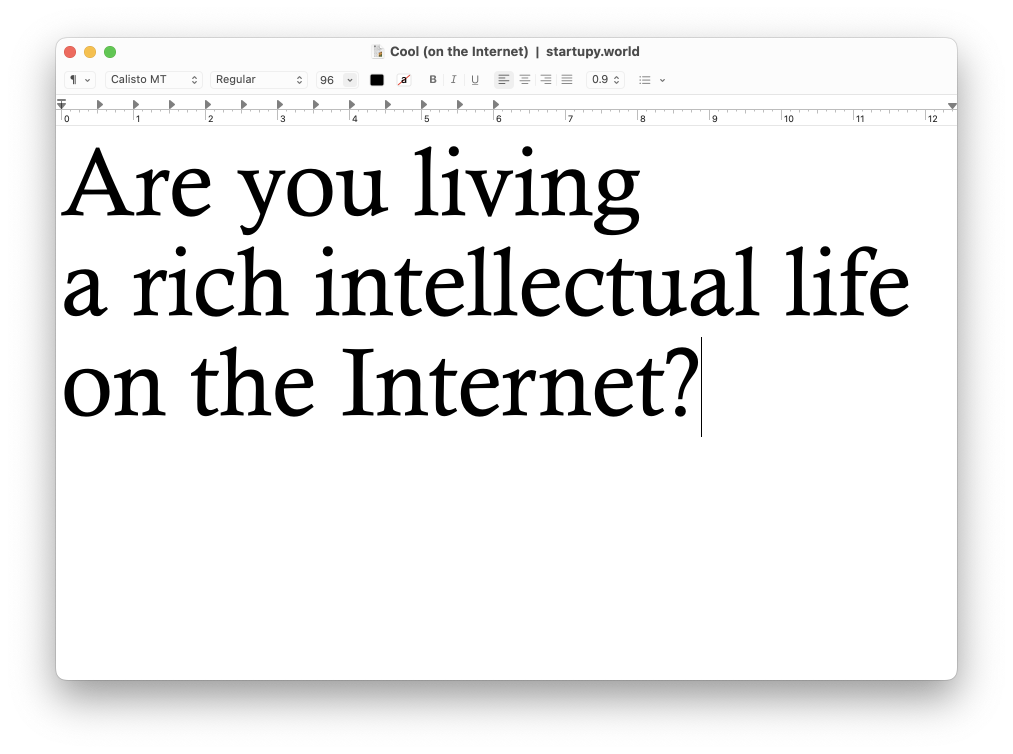Curate the Internet, Comprehend the World: Introducing Startupy
Or: Against an Algorithmic Approach
We are drowning in information, while starving for wisdom. —E.O. Wilson
I am not afraid of storms, for I am learning how to steer my ship. —Louisa May Alcott
Above: Navigating our current roaring twenties.
The internet feels more chaotic every day.
No longer mere network, it resembles city or universe more than simple collection of connected computers.
As my friend Rex Woodbury wrote in a recent piece:
New York is chaotic, wild, and unruly. The internet is chaotic, wild, and unruly.
New York pulses with a frenzied electricity; so does the internet. In many ways, New York is a metaphor for the internet…
New York, like the internet, is messy and imperfect, but beautiful in that imperfection. What I love about New York and about the internet is that they each embody a collision of humanity.
Like New York, the internet never arrests its massive sprawl. Instead, it exists as complex adaptive system that renders senses overworked and synapses under-rested.
To open any app is to wade into frenzied maelstrom whipped by gale-force winds. Whether requests, reminders, or retweets, waves and winds alike pummel your attention as you try your best to tread water. Like a riptide, these forces pull you in, in, in despite your best efforts. Resistance is futile in the face of this digital deluge.
Put simply, our minds were not designed to comprehend such intricate systems. As mathematician Stephen Wolfram once wrote, “[T]hings seem complex if we don't have a simple way to describe them.” Such frenetic complexity renders us numb as our brains bathe in vat full of dopamine and serotonin.
It would be a humorous image were it not so depressingly Pavlovian. Instead of bells, we salivate at the dancing pixels and intermittent notifications that emit from a silicone slot machine which masquerades as a pocket-sized supercomputer.
It’s both ironic and sad. Our minds fire ever more hyperactively as our muscles atrophy from inactivity.
As E.O. Wilson so elegantly said, “The real problem of humanity is the following: we have Paleolithic emotions, medieval institutions, and god-like technology.”
And yet, like pigs to the trough (and eventually to the slaughter) we keep coming back, addicted to that which is slowly killing us.
It is said that we become what we behold. That is, we shape our tools and then our tools shape us.
If the past few years are any indication, the universe is very much following the internet’s lead. We seem to be teetering ever closer to the asymptote that is unadulterated entropy.
Take the events of last week as just one example:
Venture Capitalist Josh Wolfe coined a clever phrase to describe this current turmoil. In his words, “We have reached…an Entropic Apex—a moment of maximum instability and imbalance where things are easily torn apart or fall to pieces.”
Cambridge Professor Helen Thompson agrees:
The last two decades have brought a powerful tide of geopolitical, economic, and democratic shocks onto the world. Their fallout has led central banks to create over twenty-five trillion dollars of new money, brought about a new age of geopolitical competition, destabilized the Middle East, ruptured the European Union, and exposed old political fault lines in the United States—fault lines that seem to challenge even those of the tumultuous 1960s and 1970s when the specter of nuclear war and the trauma of violent riots and political assassinations cast a long shadow over the future of the Republic.
Whew.
I mean, what gives?
What are we mere mortals to do in this face of this unrelenting chaos, this information overload?
It is the Red Queen’s Race to end all Red Queens’ Races. We need to run ever faster to stay in the race (let alone to reach its metaphorical podium). Our attention span grows shorter as our time spent creating and consuming content only expands.
Take a deep, deep breath with me, dear reader.
Not all is lost. For, there is another way.
In the same letter, Wolfe continues, “And yet, human ingenuity has always been about building in the face of the second law of thermodynamics.”
That’s exactly what the brilliant Sari Azout is doing as Founder and CEO of Startupy. To her, Startupy represents:
[t]he world's first community-curated knowledge graph. [It is a place to] discover the world's most valuable tech, culture, and startup insights, mapped and indexed by the best and brightest curators. [With] Zero SEO BS.1
Imagine if Reddit, Wikipedia, the Social Science Research Network, ResearchGate, and Twitter had a more sartorially-elegant, sophisticated, insightful child. In this particular case, the sum far exceeds its constituent parts.
Just as Figma makes design both collaborative and communal, so too does Startupy knowledge work, research, and intellectual inquiry. It turns what is all too often a single-player game into a multi-player one.
It takes what curious curators and link hoarders once relegated to cluttered bookmarks or folders and brings these resources out into the open. Once there, a frenetic hubbub of passionate nerds delve ever more deeply into their chosen areas of interest, passion, and expertise, making public, networked connections and associations all the while
It embodies James Clear's advice: “Do interesting things. Share them publicly."
More than all of this, it dares to ask the following incisive question:
If your answer is resounding no or remorseful silence, you would do well to give Startupy a whirl.
It imagines a better internet, one where individuals do not merely skim the surface, read everything, and remember nothing.2
It rejects algorithms—what Cathy O'Neil cleverly terms Weapons of Math Destruction—and returns our intellectual autonomy and agency.
It better hones our attention so as to save time, putting us firmly in control of our exploratory journeys versus relegating us to passive passenger.
It trains us to ask better questions in order to arrive at richer answers.3
With Startupy, you need not take up intellectual arms alone.
It is informational scythe that harvests the very best fruits of human intellectual labor.
It helps us grasp that no work or idea stands as an island. But rather, all true, decent, beautiful things exist as ecosystems of intertwined pasts and related proximities.
It is important because—just like Wayne Gretzky—it is “[skating] to where the puck is going to be, not to where it has been.”
That is, this weird, wacky knowledge graph helps its users better understand both present and past so as to better anticipate coming future.
Amidst this Entropic Apex, consider Startupy your refuge. Like a compass or sextant on the high seas, it properly orients and organizes so as to find True North. Its cardinal directions are neither East nor West, but rather a perky latticework of networked serendipity.
It transforms passive consumption into active curation. By doing so, it strengthens those interoperable, interdisciplinary connections that lead to the innovations, breakthroughs, and remixes that drive our complex adaptive system forward.
Jump in!
Per my about page, White Noise is a work of experimentation. I view it as a sort of thinking aloud, a stress testing of my nascent ideas. Through it, I hope to sharpen my opinions against the whetstone of other people’s feedback, commentary, and input.
If you want to discuss any of the ideas or musings mentioned above or have any books, papers, or links that you think would be interesting to share on a future edition of White Noise, please reach out to me by replying to this email or following me on Twitter.
With sincere gratitude,
Tom
Charlie Warzel’s ruminations on the evolution of Google Search come to mind: Most people don't want their information mediated by bloated, monopolistic, surveilling tech companies, but they also don't want to go all the way back to a time before them. What we really want is something in between. The evolution of Google Search is unsettling because it seems to suggest that, on the internet we've built, there's very little room for equilibrium or compromise.
Emerson comes to mind with his classic bon mot: "I cannot remember the books I've read any more than the meals I have eaten; even so, they have made me.”
Professor Neil Postman’s quote on the value of questions comes to mind: “Once you have learned to ask questions—relevant and appropriate and substantial questions—you have learned how to learn and no one can keep you from learning whatever you want or need to know.”







Inspiring!